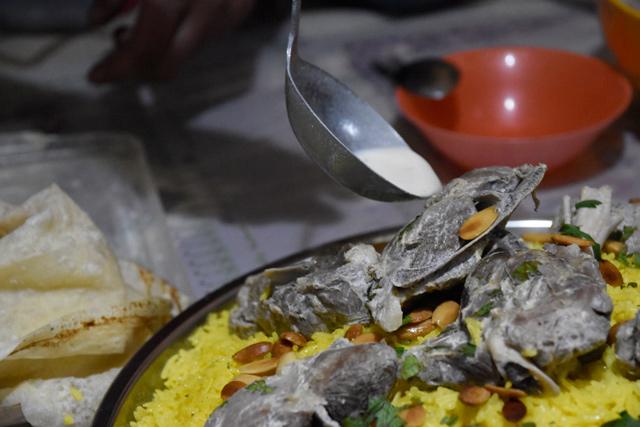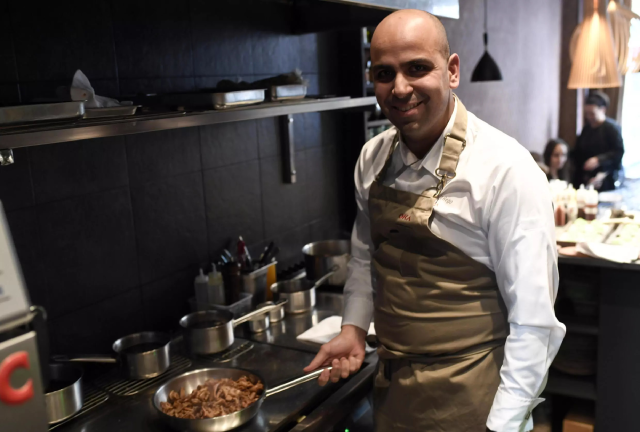You are here
Jordanian top chef on journey through competition; why he almost turned down invitation
By Maram Kayed - Mar 04,2019 - Last updated at Mar 04,2019

In this undated photo, Ali Ghzawi holds the Top Chef trophy after becoming the first Jordanian to win the competition (Photo courtesy of Facebook)
AMMAN — At some point in their life, everyone faces an ultimatum. Ali Ghzawi’s was: “Do I leave a job where I have established myself and built a reputation, or do I chase a long-time dream of mine that has no guarantee of being fulfilled?”
Ghzawi was the first Jordanian to win the Top Chef Middle East competition in what was its third season. He was also the youngest chef ever crowned.
Ghzawi told The Jordan Times his first experience with food was at age 17, selling sandwiches he had made for classmates and serving around 120 students in the end.
“I think the school’s cafeteria was on the verge of closing,” he joked.
After discovering his passion for food and his talent in making it, Ghzawi enrolled in the Royal Academy of Culinary Arts (RACA).
“Ghzawi always took initiative. He would ask for extra projects all the time. When I would give him an assignment to come up with one recipe, he would come up with three instead,” said Mohammed Zubaidi, head pastry chef at RACA.
Graduating at 19, Ghzawi did his first internship at the Four Seasons Hotel, but then moved to Barcelona for his second internship at a two-star Michelin restaurant owned by the Catalan chef, Paco Pérez.
“I had always admired Chef Paco Pérez and Chef Ferra Adria, both of whom had trained in Barcelona,” Ghzawi said.
According to Ghzawi, his eight-month experience in Barcelona “taught me a lot”, the most important of which was the discipline needed to become a chef. “I had to work continuous 18-hour shifts. It was tough, but every minute was worth it.”
After returning to Jordan, he became a demi chef de partie at 20, working his way up to sous chef at 23.
Being a sous chef at the W Hotel in Amman, Ghzawi had established his reputation by the age of 25, and after posting pictures of his food and recipes on Instagram, he was approached by a crew member of MBC’s Top Chef.
Flattered, but unable to take time off work, Ghzawi said he initially refused the offer. After being persuaded by the crew, he auditioned for the show and scored the highest among the candidates.
However, he was still reluctant and said that if it had not been for a close colleague’s advice, he may not have decided to take the risk between a stable job and an unforeseeable future.
On the show, Ghzawi made it to the finale. As an individual chef, he was never in the bottom three in any of the challenges.
The time on the show allowed him to “develop both as a person and as a chef”, he said. “I discovered who Ali the chef was, as well as Ali the person. Working under pressure made me aware of my abilities as well as my limits. On the other hand, working with various nationalities made me develop as a person and become more understanding.”
Most notably during the season, the Jordanian chef was applauded for his attitude. Chef Mona Mosly said in one episode: “Throughout this season, you have taken our constructive criticism with grace and used it to your own advantage, which is very commendable.”
“We were given around five months to train for the finale. I had planned to go to London where my good friend is, the one who advised me to go on the show and had arranged for me to be trained by Michelin-star chefs,” Ghzawi said.
However, Ghzawi’s visa was rejected, making him both jobless and without a place to train.
“I was depressed for more than a week. All these dark thoughts started taking a hold of me, telling me I have destroyed my golden reputation for nothing,” he recalled.
However, a phone call with his old teacher, Mohammed Zubaidi, renewed his hope, when Zubaidi told him to come back to RACA to refresh his memory and skills, as well as work with him in his field of expertise which was pastries.
After training with Zubaidi, Ghzawi had regained his ambition. “I transformed my room into a work space. I even took out my bed. To me, sleep was not as important as winning,” he recalled.
For the remaining months, he studied cookbooks, watched Top Chef competitions in other regions and replayed what was aired of his season to analyse the weaknesses and strengths of his competitors, as well as the judges’ tastes.
Ghzawi said his bedroom wall was covered with notes scouting the competition, inventing recipes and developing a strategy for his finale.
His hard work paid off.
He was crowned Top Chef in a finale where he had the best dishes throughout all three challenges.
Michael Ellis, a renowned American chef, told him that “if I could give you a star on this dish alone, I would”.
Ghzawi’s story at age 25 embodies the message he wants to send, he said — hard work pays off. “I competed with chefs who had experience equal to my age. That is how young I was, and I still won. This is what I want to tell the youth: age is just a number. Follow your dreams, no matter how crazy they may seem.”
Ghzawi’s next step is transforming Arabic-Levant cuisine, particularly Jordanian cuisine. His first innovation was mansaf ravioli. “High-end chefs usually switch to Western cuisine once they make it. While that is great, there is so much that can be done to our own cultural food. I want to take our cultural food to the next level.”
Related Articles
AMMAN — A sumptuous Iftar (fast breaking meal) during the holy month of Ramadan is a long-cherished tradition.
PARIS — “My mum doesn’t agree with what I do here: At home, we don’t eat like this,” laughs Alan Geaam, the first Lebanese chef to ear
DEAD SEA — A scholarship from the King Abdullah II Fund for Development (KAFD) was instrumental in realising the dream of Sameeha Bin


















